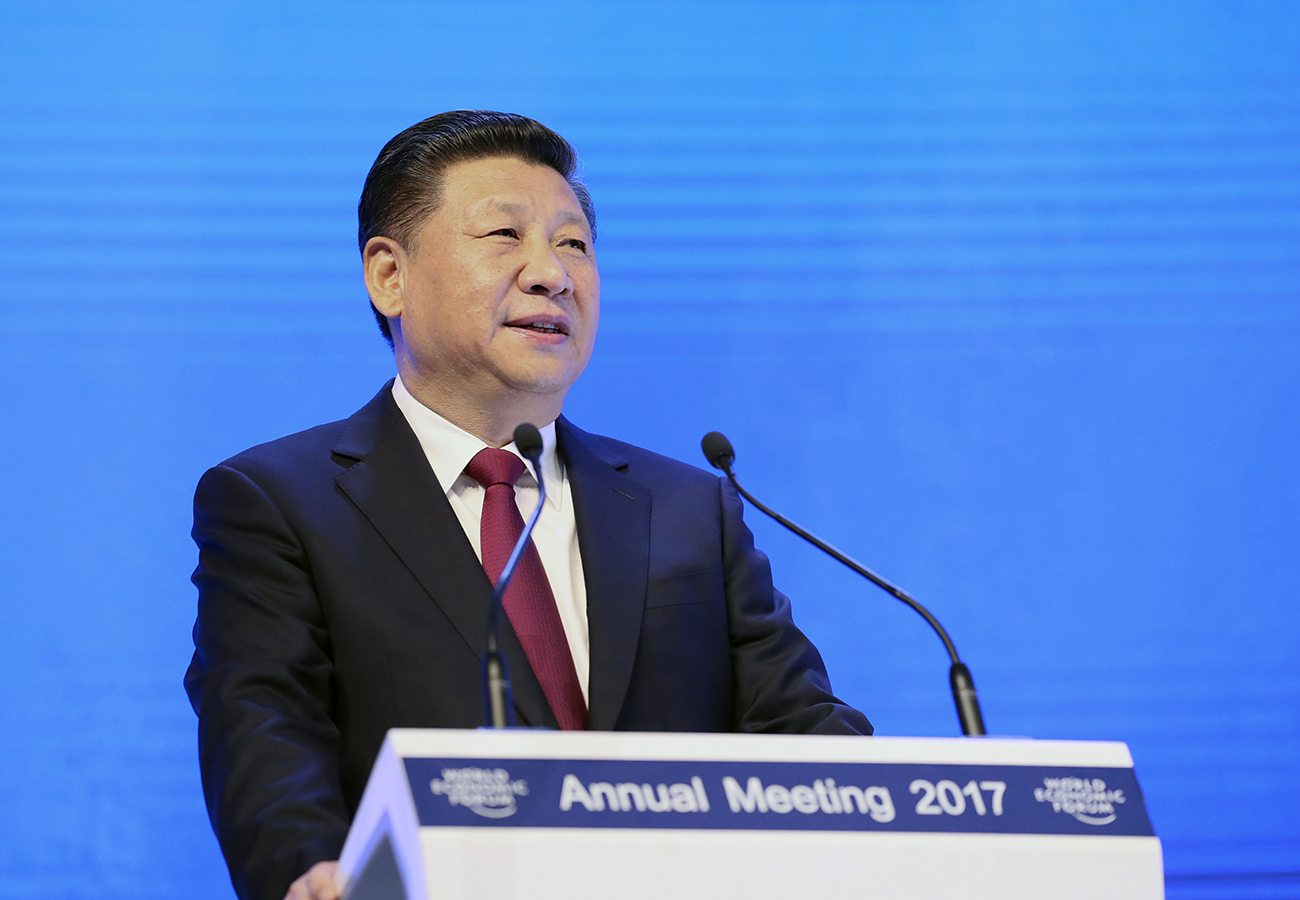Media Report

- The Wall Street Journal reports: "Chinese President Xi Jinping offered a full-throated defense of economic globalization at a time of global uncertainty fueled by Britain's decision to leave the European Union and the U.S. election victory of Donald Trump. 'Some people blame economic globalization for the chaos in our world,' Mr. Xi said in a speech at the World Economic Forum in Davos, Switzerland. Mr. Xi countered the notion, saying that neither the refugee crisis nor the international financial crisis were the product of such globalization. In particular, he said, the financial crisis was the consequence of excessive profit chasing and the 'grave failure of financial regulation.' Mr. Xi, the first Chinese head of state to attend the Davos meeting, also offered an implicit rebuke of Mr. Trump, who has threatened to impose tariffs on China.'No one will emerge as a winner in a trade war,' Mr. Xi said. Mr. Xi also called the Paris climate accords a responsibility for future generations. Mr. Trump, who assumes office on Friday, has said he intends to withdraw from the agreement. Mr. Xi spoke at length about China's own economic growth record, saying it was built on the back of Chinese industriousness under the leadership of the Communist Party."
- Foreign Affairs comments: "China is a disruptive power but not a revolutionary one. Its size, wealth, and assertive foreign policy lead it to demand significant changes to existing institutions, but it does not seek to overturn the current international order wholesale. Just half a century ago, Mao Zedong's China did indeed offer a distinctly revolutionary vision of world politics and China's role in it. Today, in contrast, Beijing doggedly pursues its national interests and territorial claims yet lacks a coherent alternative to the prevailing system and is actually a member of nearly every one of the existing major institutions. Yet China is a reluctant stakeholder—inside the tent, but still ambivalent and often dissatisfied. China's extraordinary rise in recent decades has earned it the leverage to demand a greater say in international affairs. It has acquired growing military power, trillions of dollars in foreign exchange reserves that can be recycled into direct investments, and new influence in developing countries from Africa to Central Asia. These facts mean that Beijing can now either support or undermine regional and global governance. Dealing with China's rise and revisionism will require greater creativity and strategic coherence than the West has displayed to date."
- The Financial Times reports: "China's top judge has fired a warning shot at judicial reformers by formally acknowledging that China's court system is not independent of the Communist Party and rejecting attempts to make it so. Zhou Qiang, Supreme People's Court president, denounced the idea of judicial independence over the weekend, an about-face that jeopardises far-ranging efforts to create impartial legal institutions in China. 'Bare your swords towards false western ideals like judicial independence,' Mr Zhou told a gathering of higher court officials. Only two months before, he had said that party committees should not interfere in the political process. 'This statement is the most enormous ideological setback for decades of halting, uneven progress toward the creation of a professional, impartial judiciary,' said Jerome Cohen, an 86-year old American lawyer who has spent most of his career promoting legal exchanges between the US and China. 'It has already provoked some of China's most admirable legal scholars to speak out in defiance, and I fear not only for their academic careers but also for their personal safety.' Mr Zhou's declaration is seen by some analysts as a response to the recently concluded investigation of the Supreme People's Court by China's anti-corruption watchdog"
Calendar
- 2017-01-15 China Economy Faces More Pressure and Global Uncertainty: Premier
- 2017-01-13 South China Sea: China media warn US over 'confrontation'
- 2017-01-12 Trump Nominee’s Proposal to Block China From Islands Sets Off Alarms
- 2017-01-11 A New Way to Hold the U.S.-China Relationship Together
- 2017-01-10 China Joins Davos as Trump Presidency Vies for Spotlight
- 2017-01-09 Alibaba's Jack Ma met with Trump to talk jobs
- 2017-01-08 China capital controls help slow cash outflows
- 2017-01-06 China Doubles Down on Defending Its Currency
- 2017-01-05 China to invest £292bn in renewable power by 2020
- 2017-01-04 With Choice of Trade Negotiator, Trump Prepares to Confront Mexico and China
News
- The Wall Street Journal China's Xi Jinping Defends Globalization at Davos
- The Financial Times China's top judge denounces judicial independence
- The Guardian Trump warming to reality of climate change, says senior Chinese official
- Bloomberg China's Oil Collapse Is Unintentionally Helping OPEC
- The Telegraph China busts 50 factories making fake branded seasoning with 'dangerous' ingredients in latest food scandal
- The Financial Times Xi Jinping delivers robust defence of globalisation at Davos
- Reuters Audi to expand electric car range in China with FAW
- The Wall Street Journal China Goes Food Shopping—to Russia
- USA Today 'One China' policy: What is it and why it's sparking ire for Trump
- Reuters China tightens party loyalty requirements in sensitive year
- Bloomberg China Said to Intervene in Stock Market as Xi Attends Davos
- The Associated Press Taiwan ex-premier heading delegation to Trump inauguration
- The Associated Press China Says 2,500 Wartime Japanese Chemical Weapons Destroyed
Commentary
- Foreign Affairs China and the World
- The New York Times: Sinosphere U.S. Ambassadors in Asia Make Final Plea for Dead Trans-Pacific Trade Pact
- Fortune China Has More To Lose Than the U.S. Under a Trump Administration
- Forbes As Trump & Brexit Move Forward, 'Davos Man' Picks New Hero: Chinese Communists
- The Diplomat The Future of the Asia-Pacific Security Architecture, as Seen by China
- The Wall Street Journal: China Real Time Report China's Executive Pay Data Show it Pays to Diversify
- Quartz Welcome to an emerging Asia: India and China stop feigning friendship while Russia plays all sides
